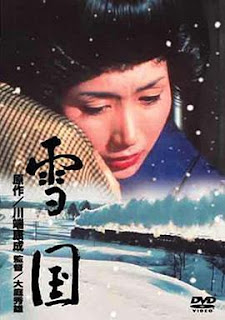92. Nî-ko͘-am lâi chit jiâu-se, mā bē-bái
Shimamura tó tī bîn-chhn̂g thiaⁿ khòaⁿ-âng-hio̍h ê lâng-kheh chhiùⁿ Nō-kio̍k liām-iâu ê hit-kang, chia tō í-keng chho͘-chhù lo̍h-seh ah. Kin-nî ê hái hām soaⁿ sī-m̄-sī mā í-keng tân kòe ah? Shimamura ko͘ chi̍t-lâng lí-hêng lâi un-chôaⁿ-tiûⁿ liân-sòa hām Komako sio-hōe ê tiong-kan, ká-ná i ê hīⁿ-khang mā piàn khah lāi ah, kan-ta sim-koaⁿ siūⁿ tio̍h hái a̍h soaⁿ tân, hīⁿ-khang lāi-té ká-ná tō ū hit-lō hūiⁿ-hūiⁿ tih tân ê siaⁿ.
"Nî-ko͘ mā tio̍h koaiⁿ-mûi kòe tang neh. Ū gōa-chē lâng ah?"
"Hèⁿ, put-chí-á chē lioh."
"Kan-ta nî-ko͘ chek chò-hóe, kúi-ā kò goe̍h tī seh lih boeh chhòng sáⁿ? Kó͘-chá chit-kho͘-lē-á ū tih chit jiâu-se, tī nî-ko͘-am lâi chit, mā bē-bái neh."
Shimamura chiah-ê hòⁿ-kî ê ōe, ulóng mī-tiàm cha-bó͘ thiaⁿ tio̍h kan-ta sī chhiò-chhiò.
Shimamura tī chhia-thâu tán túiⁿ khì ê hóe-chhia, tán kah boeh nn̄g-tiám-cheng. Núi-núi ê ji̍t lo̍h-khì í-āu, khong-khì hoán léng, thiⁿ-téng ê chheⁿ léng-léng chhut-hiān. I ê kha léng peng-peng.
M̄-chai ūi sáⁿ-mih boeh chhut-khì ê Shimamura, tún-lâi kàu un-chôaⁿ-tiûⁿ. Chhia keng-kòe se̍k-sāi ê pêng-kau-tō, it-ti̍t sái kàu sîn-siā ê sam-á nâ piⁿ, gán-chêng chhut-hiān chi̍t-keng tiám-teng ê chhù, Shimamura hòng-sim ah. Hit-keng sī Kikumura (菊村) sió liāu-lí-tiàm, mûi-kháu khiā saⁿ-sì-ê gē-tòaⁿ tih khai-káng.
I tú tih siūⁿ, Komako mā ē tī hia bô, sûi to khòaⁿ tio̍h Komako.
Chhia ê sok-tō͘ bān lo̍h-lâi, tāi-khài sī ūn-choán-chhiú chai-iáⁿ Shimamura hām Komako ê tāi-chì, chū án-ne sái khah bān.
Shimamura hut leh oa̍t-thâu khòaⁿ hām Komako tian-tò-péng hit hiàng. I chē ê chhia-lián jiah chheng-chhó lâu tī seh téng, khò thiⁿ-chheⁿ ê kuiⁿ, ē-tàng khòaⁿ kàu chin hūiⁿ.
Chhia lâi kàu Komako thâu-chêng. Komako ba̍k-chiu kheh chi̍t-ē, hut leh thiàu chiūⁿ chhia. Chhia bô thêng, chiàu goân-lâi ê sok-tō͘ bān-bān peh kiā-lō͘. Komako oan-io ta̍h chiūⁿ chhia-mûi gōa ê ta̍h-pang, chhiú lia̍h chhia-mûi ê pèⁿ.
Komako thiàu khí-lâi ê khoán-sè, ká-ná sī hō͘ chhia khip khí-lâi, Shimamura kám-kak ū chi̍t-chūn un-loán ê mi̍h-kiāⁿ chhèng kòe-lâi, i tùi Komako chit-ê tōng-chok, pēng bē kám-kak bô chū-jiân a̍h sī hûi-hiám. Komako gia̍h khí chi̍t-ki chhiú-kut, ká-ná sī boeh siâm chhia-thang. Yi ê chhiú-úiⁿ liu lo̍h-khì, hiàn-chhut lāi-té-saⁿ ê sek, thàu kòe kāu-kāu ê thang-á po-lê, hiān-hiān khòaⁿ tī kôaⁿ kah giān-giān ê Shimamura ba̍k-chiu lāi.
--
92. 尼姑庵來織皺紗 , mā 袂䆀
Shimamura tó tī 眠床聽看紅葉 ê 人客唱 Nō 劇念謠 ê 彼工, 遮 tō 已經初次落雪 ah. 今年 ê 海和山是毋是 mā 已經霆過 ah? Shimamura 孤一人旅行來溫泉場連紲和 Komako 相會 ê 中間, ká-ná 伊 ê 耳空 mā 變較利 ah, 干焦心肝想著海 a̍h 山霆, 耳空內底 ká-ná tō 有 hit-lō hūiⁿ-hūiⁿ tih 霆 ê 聲.
"尼姑 mā 著關 mûi 過冬 neh. 有偌濟人 ah?"
"Hèⁿ, 不止仔濟 lioh."
"干焦尼姑積做伙, 幾 ā 個月 tī 雪 lih 欲創啥? 古早這 kho͘-lē-á 有 tih 織皺紗, tī 尼姑庵來織, mā 袂䆀 neh."
Shimamura chiah-ê 好奇 ê 話, ulóng 麵店查某聽著干焦是笑笑.
Shimamura tī 車頭等 túiⁿ 去 ê 火車, 等 kah 欲兩點鐘. Núi-núi ê 日落去以後, 空氣反冷, 天頂 ê 星冷冷出現. 伊 ê 跤冷冰冰.
毋知為啥物欲出去 ê Shimamura, tún 來到溫泉場. 車經過熟似 ê 平交道, 一直駛到神社 ê 杉仔林邊, 眼前出現一間點燈 ê 厝, Shimamura 放心 ah. 彼間是 Kikumura (菊村) 小料理店, mûi 口徛三四个藝旦 tih 開講.
伊拄 tih 想, Komako mā 會 tī 遐無, 隨 tō 看著 Komako.
車 ê 速度慢落來, 大概是運轉手知影 Shimamura 和 Komako ê 代誌, 自 án-ne 駛較慢.
Shimamura 忽 leh 越頭看和 Komako 顛倒 péng 彼向. 伊坐 ê 車輪跡清楚留 tī 雪頂, 靠天星 ê kuiⁿ, 會當看到真 hūiⁿ.
車來到 Komako 頭前. Komako 目睭瞌一下, 忽 leh 跳上車. 車無停, 照原來 ê 速度慢慢 peh 崎路. Komako 彎腰踏上車 mûi 外 ê 踏枋, 手掠車 mûi ê 柄.
Komako 跳起來 ê 款勢, ká-ná 是予車吸起來, Shimamura 感覺有一陣溫暖 ê 物件衝過來, 伊對 Komako 這个動作, 並袂感覺無自然抑是危險. Komako 攑起一支手骨, ká-ná 是欲 siâm 車窗. 她 ê 手 úiⁿ 溜落去, 現出內底衫 ê 色, 透過厚厚 ê 窗仔玻璃, 現現看 tī 寒 kah giān-giān ê Shimamura 目睭內.
--
92.
The first snow had fallen the morning he lay in bed listening to the No recital. Had the roaring already been heard, then, in the sea and the mountains? Perhaps his senses were sharper, off on a trip with only the company of the woman Komako: even now he seemed to catch an echo of a distant roaring.
"They'll be snowbound too, will they? How many are there?"
"A great many."
"What do they do with themselves, do you suppose, shut up together through the snows? Maybe we could set them to making Chijimi."
The woman smiled vaguely at the inquisitive stranger.
Shimamura went back to the station and waited two hours for a train. The wintry sun set, and the air was so clear that it seemed to burnish the stars. Shimamura's feet were cold.
He arrived back at the hot spring not knowing what he had gone out looking for. The taxi crossed the tracks into the village as usual. A brightly lighted house stood before them as they skirted the cedar grove. Shimamura felt warm and safe again. It was the restaurant Kikumura, and three or four geisha were talking in the doorway.
Komako will be among them--but almost before he had time to frame the thought he saw only Komako.
The driver put on the brakes. Apparently he had heard rumors about the two.
Shimamura turned away from her to look out the rear window. In the light of the stars, the tracks were clear against the snow, surprisingly far into the distance.
Komako closed her eyes and jumped at the taxi. It moved slowly up the hill without stopping. She stood on the running-board, hunched over the door handle.
She had leaped at the car as if to devour it, but for Shimamura something warm had suddenly come near. The impulsive act struck him as neither rash nor unnatural. Komako raised one arm, half-embracing the closed window. Her kimono sleeve fell back from her wrist, and the warm red of the under-kimono, spilling through the thick glass, sank its way into the half-frozen Shimamura.
--


No comments:
Post a Comment